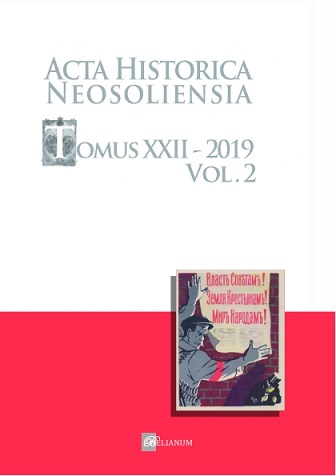The Ideology of Eastern European Agrarianism in the Programmatic Provisions of Czechoslovak and Ukrainian Political Parties (In the Face of Social and Political Turmoil of the Early 20th Century)
The Ideology of Eastern European Agrarianism in the Programmatic Provisions of Czechoslovak and Ukrainian Political Parties (In the Face of Social and Political Turmoil of the Early 20th Century)
Author(s): Serhii KornovenkoSubject(s): Politics, Agriculture, Governance, Economic history, Political history, Recent History (1900 till today), Political economy, Economic development, Socio-Economic Research
Published by: Filozofická fakulta Univerzity Mateja Bela
Keywords: Eastern European agrarianism; Czechoslovakia; Ukraine; political parties; peasantry;
Summary/Abstract: Revolutionary upheavals in Europe in the early twentieth century radically influenced the socio-political life of European countries, led to the emergence of new subjects of international relations, previously unknown phenomena. First of all, considering the topic of the study, this concerns Czechoslovak and Ukrainian statebuilding, as well as such phenomenon as Eastern European agrarianism, represented in particular by Czechoslovak and Ukrainian variants. Political parties represented it on Czechoslovak and Ukrainian soil. In Czechoslovakia, the Czechoslovak Republican (Agrarian) Party (hereinafter referred to as the CRAP), in Ukraine – the Ukrainian Democratic-Agrarian Party (hereinafter referred to as UDAP), the Ukrainian People's Community (hereinafter – UPC), the All-Ukrainian Union of Agrarians-Owners (Peasants) (hereinafter – AUAO), Ukrainian People's Party (hereinafter – UPP). The author, on the basis of an analysis of the programmatic provisions of these parties, found that they were clearly agrarian. In spite of certain differences caused by the regional specificity of the countries, the course of historical events, peasant-centrism was at the heart of their state ideology. They connected the socio-political and socioeconomic future of Czechoslovakia and Ukraine with the peasantry. They understood it as an active subject of history, of national state-building.
Journal: Acta historica Neosoliensia
- Issue Year: 2/2019
- Issue No: 22
- Page Range: 4-23
- Page Count: 20
- Language: English

